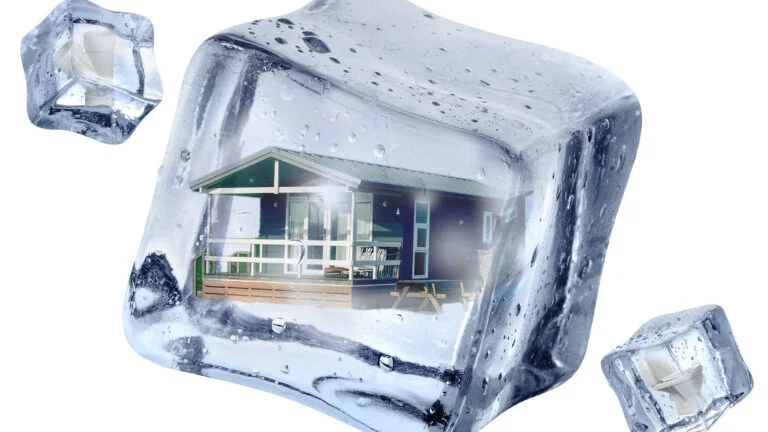
“There’s just too much that could go wrong.”
Robyne Harrison is a sales associate and senior vice president with Legacy Sotheby’s International Realty in New Hampshire. She maintains a detailed checklist of chores homeowners in northern New England need to complete in their vacation homes before the frost is on the pumpkins.
“A seasonal cottage generally isn’t heated during the winter,” she said. “The biggest thing you want to think about with those is water and plumbing.”
Any water (or other liquid) left in an unheated home will almost certainly freeze and often burst the pipes or containers holding it. That means an inconvenient and often expensive mess for the owners to deal with when spring arrives. To avoid this, the home’s water main should be shut off, and all the water must be drained. Then, all supply pipes and drains should be blown out with an air compressor. Harrison said that’s only the beginning.
“You need to drain the water heater, irrigation system, outdoor shower,” she said. “You should disconnect any outdoor hoses and drain them as well. And if there’s a heating system that won’t be in use, it should also be drained.”
Outside, Harrison recommends looking for dead or weak tree branches overhanging the house that could break and fall on the roof in a snow, ice, or wind storm and remove them. She said if a home has rain gutters, they should be cleaned so they function properly. Outdoor furniture, kayaks, and grills should be protected as well because they can become a projectile in a storm.
“Inside the house, you don’t want to leave food if you’re not going to be there,” she said. “Clean and unplug your refrigerator and leave your door a little bit open. And look for any openings that a mouse or a squirrel could use to enter your house and seal them.”
Chad Latham is a broker/agent with Fitzgibbons and Latham in Portland, Maine. He said many owners’ best winterizing efforts overlook important details. He advises homeowners who aren’t going to heat their home through the winter and aren’t certain how to properly winterize a property to consider hiring a professional to do it.
“There’s just too much that could go wrong,” he said. “For example, some people don’t realize that you must completely empty the toilet bowl or add antifreeze if the home is left unheated. Otherwise, the water can freeze and crack the toilet. It’s a simple thing, but repairs can be expensive. It can be worth paying a professional a few hundred dollars to do it correctly.”
Even if the home is kept heated to at least 50 degrees throughout the cold season, owners should still pay attention to what’s going on in their vacation home — especially in unforgiving winters like those of Maine.
“You have to keep an eye on it because if the home loses electricity for four or five days in a bad storm, then the plumbing and possibly the heating system are going to be shot, which happened to me years ago,” Latham said.
Herb Holmes, who owns Atlantic Home Partners in Orleans on Cape Cod, has been inspecting homes for prospective buyers for more than 40 years. In recent years, he’s begun managing vacant properties in the late fall through early spring. He said winterizing a vacant home seems simple, but it’s the myriad nuances most people don’t know or think about that can be problematic.
“Many homeowners want to conserve fuel and costs and don’t set the thermostat high enough,” he said. “That can become a problem if they lose power. Maybe they started out with the heat only being at 40 or 45, but that temperature drops quickly when the power is off. Some insurance companies now require the thermostat be set at a minimum of 60 degrees when it’s unoccupied.”
Holmes said most homeowners don’t have the knowledge or experience to winterize a home properly. He works with a plumber to ensure that when the water is turned back on in the spring, there are no surprises.
“Another thing most people don’t understand: You‘ve got to put antifreeze in the washing machine pump as well as in the dishwasher pump,” he said. “Then you start the cycle and shut it off before the pump starts. And you don’t just dump some antifreeze in; you use a specified amount — that way you’re not wasting it. Antifreeze is not cheap, and it’s no good for your septic system, either. Some plumbers don’t understand that.”
He said in most cases, it’s probably safest to let a professional do the winterizing, but technology is an increasingly great tool homeowners can use to monitor their home from afar.
“Some people install internet-connected thermostats, which is a big plus,” he said. “They can see on their phone when something’s wrong with one of the thermostats, and they give me a call, and I can go over there and check it out right away. And you can keep an eye on things with outdoor video cameras, too. An automatic water main shutoff valve can send a notification to your phone if something is leaking, and it automatically shuts the water off.”
Quick winterizing checklist